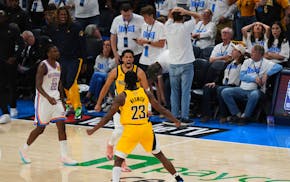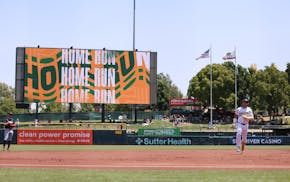The distance between the penalty spot and the goal is one of the shortest distances on the soccer field. It's 12 yards, short enough that most people secretly believe that they could beat a professional goalkeeper from the penalty spot, short enough that the historical penalty conversion rate – a shade under 80% – seems surprisingly low.
The longest distance on a soccer field is the length of the field, but talk to enough people in soccer, and they agree: Actually, the longest distance is the length of the walk from the halfway line to the penalty spot, during a game-deciding penalty shootout.
"People have described it as the longest walk of their life," said Minnesota United manager Eric Ramsay.
As the Loons get set to face Real Salt Lake in the playoffs, beginning Tuesday night in Utah, the looming specter of the penalty shootout swims back into view. Every game in the best-of-three opening round of the playoffs must have a winner, and if a game is tied at the end of regulation, it goes directly penalty kicks.
Given that RSL and Minnesota have drawn all four matches they've played in the last two years, and six of the eight they've ever played in Utah, it seems probable that the penalty spot will help decide this series — and the Loons are trying to get prepared.
They practiced penalties at the end of Wednesday's training session, and are trying to find a way to increase the pressure for Monday, when they'll stage another practice shootout.
"We'll try and gently ramp the pressure up as we go," said Ramsay, who acknowledged that he wasn't naïve enough to believe that the team could replicate the pressure of a shootout in a practice environment. "We want it to be as [little] of a shock as possible when that moment almost inevitably comes, as you feel it will at some point in these playoffs."
The Loons have been pretty good in shootouts in the MLS era, winning five of their six attempts — two in the U.S. Open Cup, two in the Leagues Cup, and one at the Covid-era MLS is Back tournament. Their only loss came in their only playoff shootout, in 2022 at FC Dallas.
Misses can haunt
Midfielder Wil Trapp knows what it's like to be on both sides of this coin flip. He missed in the playoffs but came back to score twice in two tries in 2023 — and then exorcised some demons in the regular season this year, when he converted from the spot in a regular-season match in Dallas.
"It's just reps. It's just doing it in training," said Trapp. "All that stuff comes down to, in the moment, who's confident? I think that confidence comes from doing it in training and then ultimately feeling ready to do it."
That helps explain why some of the most successful Loons in shootouts have been players who are confident, but aren't natural goal-scorers. For example, center backs Michael Boxall and Miguel Tapias were a combined 5/5 last season.
There have been players who never took another penalty after missing in a key situation, but Trapp said that bouncing back is second nature, both for him and for professional athletes generally. "It's just looking at it as a singular event and not something that's more insidious or deeper," he said. "Players miss penalties all the time. You can either run off from that, or you can go take the next one."
Difference maker
On the other end of the field, Minnesota has a penalty-shootout weapon in Dayne St. Clair. In MLS regular-season play, among goalkeepers who've faced at least five penalties, St. Clair has the best percentage in league history; opposing teams have scored only five times in 11 tries against him, and he's made four saves (according to FBref.com). He's also won two of three shootouts for the Loons, including both opportunities in 2023.
"They should be scoring every single time, so anything I can get is a bonus," said St. Clair. "I always tell the guys, I know I'll get at least one."
St. Clair says he does watch video and take notes on the potential penalty takers from the other team, but in the end, it comes down to intuition. "In the moment, you have to go with whatever you feel in that second," he said. "Honestly, what I try to go into is to try to get them to miss the target, because then I don't have to worry if I dived the right way.
"A miss is a miss. As long as the ball doesn't cross the line, I'm happy."
The shootout isn't really a fair way to decide wins and losses; it's a made-for-TV event, a way of eliminating the old custom of replaying the entire match, or staging endless extra time, to determine a winner. But it's now part of soccer, and part of these playoffs — and so Minnesota United is going to do its best to be ready, when the moment comes.
David Festa's return to Twins goes south in a hurry

NBA Finals: Haliburton caps huge rally with winning jumper as Pacers stun Thunder 111-110 in Game 1

Twins call up pitching prospect Travis Adams to bullpen

